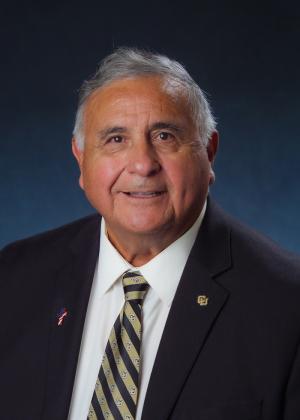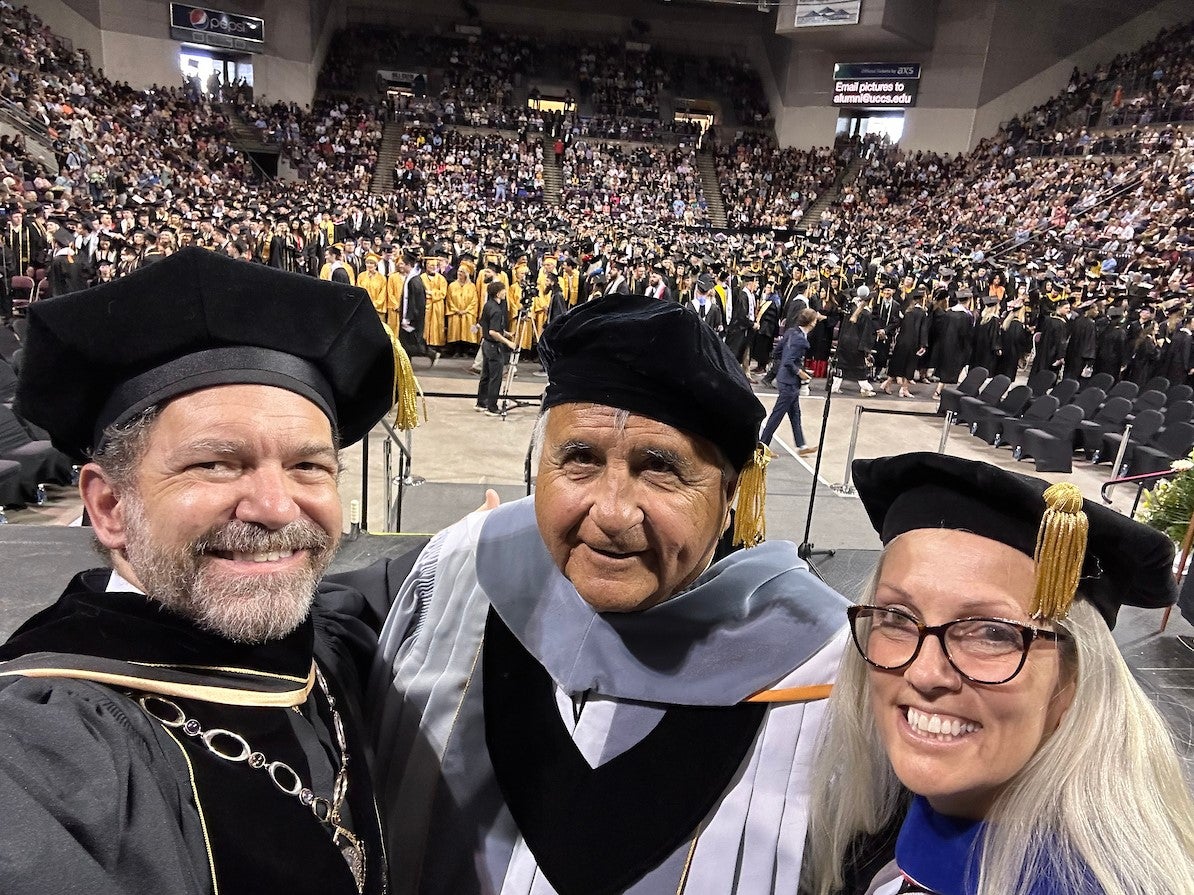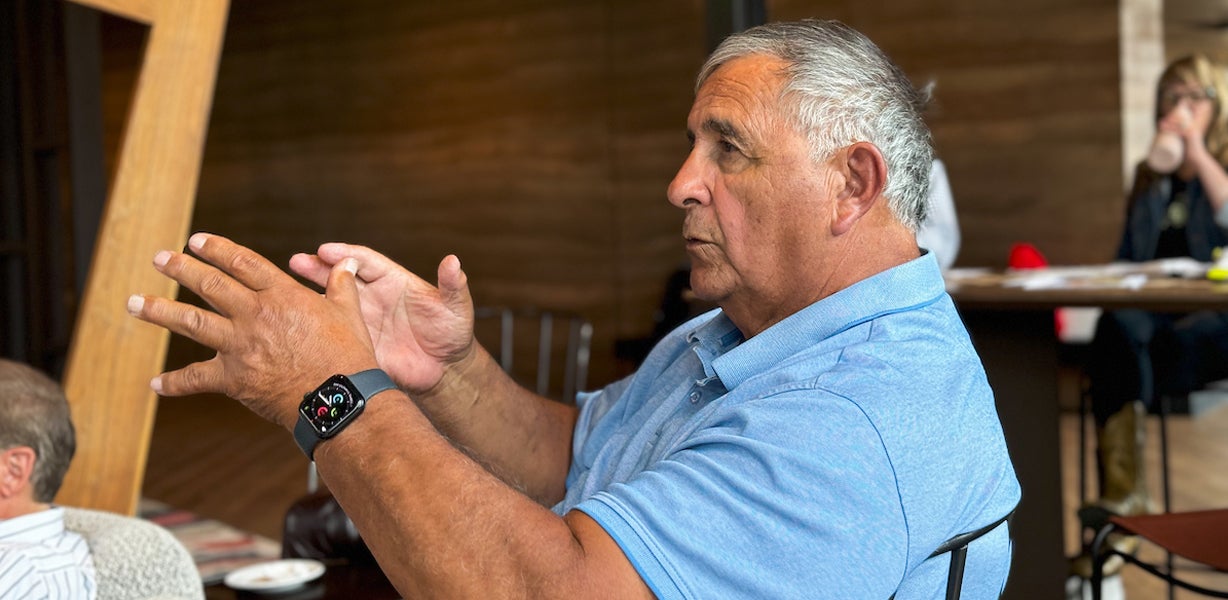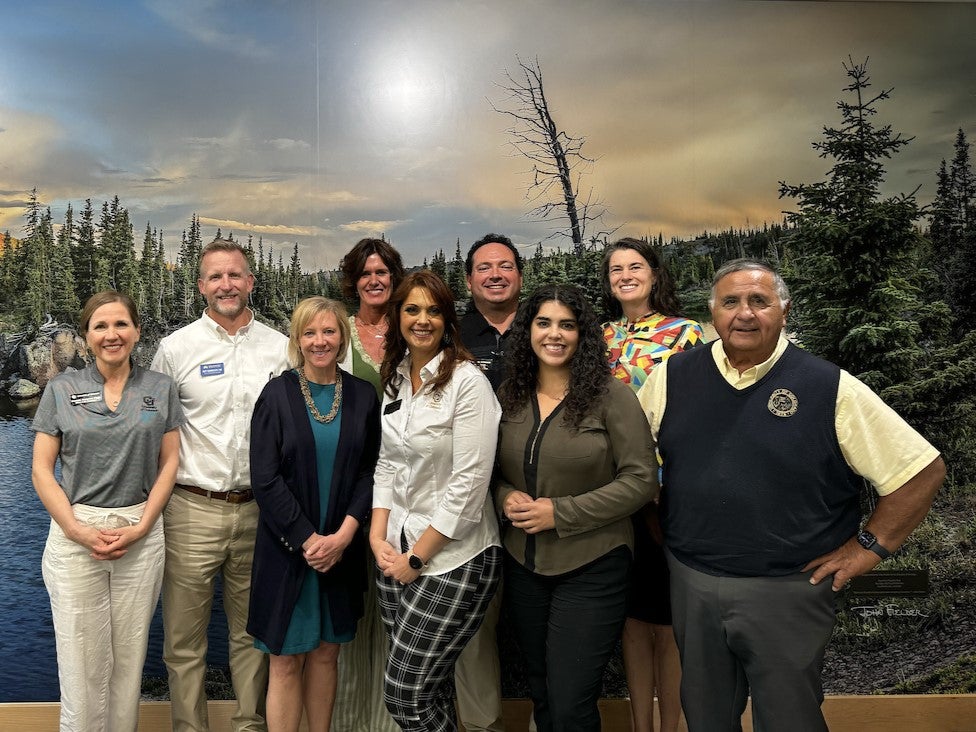Five questions for Glen Gallegos
Note: This is the first in a two-part series featuring the members of the Board of Regents whose terms conclude next month. Today, a conversation with Regent Glen Gallegos, followed next week by a conversation with Regent Lesley Smith.
The current CU Board of Regents loses its longest-serving member next month as Regent Glen Gallegos concludes his second term.

The Grand Junction Republican brought to the board his 26 years of experience in public education as a teacher, coach, principal, and Executive Director of Instruction for Eagle and Mesa County school districts. After his retirement from public education in 1997, Gallegos joined the family construction business, The Gallegos Corporation, as president of operations, overseeing projects in five states and a workforce of over 1,000.
Gallegos serves the 3rd Congressional District, the footprint of which encompasses large sections of western and southern Colorado. His 12 years as a regent included his election as board chair in 2019 and again for 2020-2021. He served as vice chair in 2016-2017 and has chaired four committees.
1. Of the work you’ve done with the board over the course of your 12 years, what stands out in your mind as the most significant?
Over 12 years, quite a few things. Anything that was associated with students: opportunities, scholarships, tuition, pieces of legislation. That was my mission, anyway, to create opportunities for students. Being involved in education as long as I have been, I think people would say I always looked out for the students. I didn’t just talk about it.
We did the very best we could with tuition. The state has something to do with that. Before I came onto the board, we had 8%, 9% tuition increases, and they haven’t gone over 3% or 4% since I’ve been there. That’s a tribute to the board and the administration.
In this job, you look out for the students and for the university. The people that make up the university – from custodians to professors to presidents – have always been pretty important to me. I’ve always voted for that cost-of-living increase that went along with the tuition vote. I know you don’t have a great university without dedicated people from top to bottom.

I think our president is doing a nice job. There’s good stability. Tremendous things are still happening for students. I like the outreach we’re doing.
It is hard to believe 12 years is coming to an end. I think we’re on a good track. Good things are happening and they’ll continue to happen. We’ll always be worried a little about money, but somehow we manage.
2. What was the most challenging aspect of serving on the Board of Regents?
For me, living in Grand Junction and representing the 3rd Congressional District, getting there is difficult. We’ve used telephone and Zoom, but you sometimes have to get that 300 miles to Boulder or Denver or Colorado Springs, with winter weather, road construction or accidents, spending four hours in Glenwood Canyon. So sometimes the challenge was just getting to the meeting and getting home. But I also made the commitment when I ran that I was going to be involved and take part in meetings, committees and graduations.
In my time, we had three different presidents, and each one was a little different. There are adjustments you make. The way that our regent terms are structured, you have new regents coming on every two or three years. There have not been a lot of regents who have finished 12 years on the board in the last five years.
3. How did your understanding of the CU system evolve over the course of your 12 years as a regent?
We just had a new election, and when you look at what they campaign on, everybody’s going to make education more affordable. Tuition is what they campaign on, and I did too. I think we tried to do the best we could. We’re not going to come in and automatically change the way education is funded, but as a newbie you think you are. Our group has done well to keep tuition affordable.
The university is a large, complex place. When you come in, you have to know your role as a regent. Why are you elected? You’ve got to know why you’re there. You’re not there to run the university on a daily basis. You’ve got the president and chancellors on the campuses who do great jobs. That’s not our job. Our job is not to be athletic director.
You want to bring your influence and experience, but the university is a big place and this is a team sport. You’re not going to get anything done if you can’t work with the president.
Our job is to do policy. And we can have a lot of influence. You need to deal with policy, and you can get a lot done. You need to stay in your lane. Good people have been making decisions at CU since 1876 and that’s going to continue.
Today, I still marvel at the things I didn’t know about the university. The work they’re doing at CU Boulder in climate and aerospace, the innovations and discoveries happening at the CU Anschutz Medical Campus. It’s an incredible place. And it’s large. After 12 years, I still don’t know all of it or understand all of it. What I do understand are the people and the opportunities for students.
4. After your term ends, what will you miss about serving on the Board of Regents?
I’ll have to find some other ways to spend the 15 to 20 hours a week I spent working as a regent. I’ll miss being involved and knowing firsthand what’s going on. I’ll miss some of the people. I’ll miss it, but I’m ready to move on.
I have a little farm in Grand Junction. I like nothing better than being out watching the flowers, irrigating, just being a part of the land. I used to keep honeybees, and I may go back to doing that. They’re incredible to watch.
Over the last 45 years, I’ve been involved in all aspects of the community. I’ve been on planning commissions and done some volunteer work. We’ve always traveled and I will continue to do that. I’ll play a little golf. I’ve got grandkids that are now in high school, so I’m getting involved and watching them play football and volleyball. I have three granddaughters in Denver.
So I’ll have plenty to do. But that does not mean I won’t miss being a regent at the University of Colorado.
5. If a newly elected regent were to ask for advice, what would you tell them?
I would say to them, get involved. Learn as much as you can. Don’t do too much for the first six months to a year.
If you can, join the Audit Committee or Governance Committee. With Audit Committee, you get a huge snapshot of CU and its workforce, the monies, where the monies go to, the CU Foundation. Governance Committee is about policy. That would make everybody a better regent in their first or second year.
Smell the roses. Thank the people for all they do. It’s an incredible place to be. It’s exhilarating when you’re sitting at CU Denver’s graduation and it looks like the state of Colorado, with a number of graduates from all walks of life. At UCCS, they have to have two graduations, because students have an average of 12 to 14 family members attending. That’s how important it is to them.
So my advice is, know why you ran, stay in your lane, get involved and enjoy it. It’s not all work. It’s not a bad assignment – it’s a great assignment.



